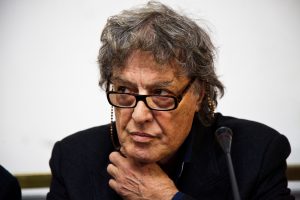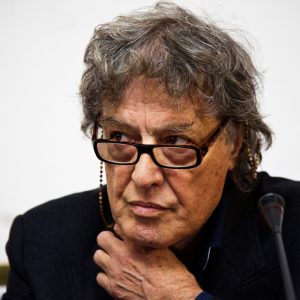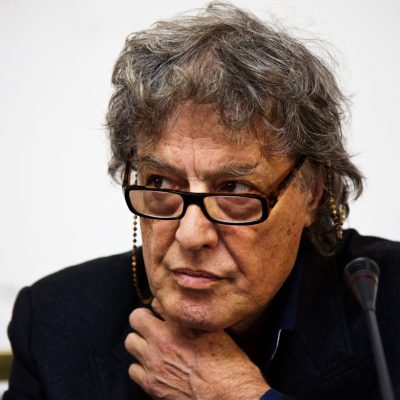26 Jul 2021 | News and features, United Kingdom, Volume 50.02 Summer 2021, Volume 50.02 Summer 2021 Extras
[vc_row][vc_column][vc_single_image image="117131" img_size="full" add_caption="yes"][vc_column_text]
Picture the scene.
I’m driving a pick-up truck. I’m dressed in a high-vis jacket and white overalls and in the back is a tonne of manure. On the side of the pick-up is the logo “BS Industries UK”. We drive up to and block the front entrance to the Houses of Parliament, immediately drawing a bevy of armed police officers (or, as I like to call them, “supporting artists”) towards us.
“You can’t park here!”
I explain that this is “Grade A bullshit” and that “the MPs ran out of bullshit so they need a fresh batch to feed to the public”.
The prank, filmed in 2013 as part of the promotional campaign for the second series of our Bafta-winning BBC show The Revolution Will Be Televised, was an expression of that quintessentially British tradition of using satire as a tool of protest. Creative direct action dressed up as a comedy sketch, if you will.
For me there is nothing more British than using satire that laughs at the powerful, and that in a very minor way holds the powerful to account. But under clause 59 of the Police, Crime, Sentencing and Courts Bill which is going through the UK parliament now public nuisance is being criminalised and I could get 10 years in jail for such a prank! Ten. Years. In. Jail. I know that’s not the funniest joke but come on…!
History teaches us that things don’t change if the status quo is not disrupted and the intention appears to be to create an environment where you can make a lot of noise, as long as you stay in your lane, but where any movement deemed effective at changing hearts and minds and making a real difference is criminalised.
The passing of the PCSB in Parliament signals an active attack on this cornerstone of British democracy. Perhaps the significance of it is that freedom to speak truth to power without the fear of recrimination or criminal sanction is a British value as well as being a fundamental tenet of freedom of speech!
What does it feel like when the democracy you grew up in starts a gradual slide towards authoritarianism? Perhaps patriotism and flag-waving replace public debate. Perhaps the very fabric of public life starts to warp and change so that rational argument about policy is replaced by questions about how many national flags were printed on said policy paper. Perhaps the worse the state of the nation becomes, the more national greatness is invoked.
But what of those who question this new status quo? In societies where the ruling class wallows in corruption and enjoys total impunity, its enemies are a free press, and those who protest are criminalised. I’m not saying we are suddenly Myanmar. I’m not saying we are even Hungary. But maybe we are becoming Hungary-lite.
In a letter to the government in March co-ordinated by Liberty and Friends of the Earth, 245 organisations said the government’s proposals were cause for “profound concern”. The organisations highlighted numerous threats to our rights, including “draconian” police powers to restrict protests. The signatories represented a wide range of interests from Amnesty International to the Ramblers.
Hundreds of mainstream charities as well as groups such as Sisters Uncut, All Black Lives UK and Reclaim the Streets have committed to building a mass movement to resist the bill. But its protest and public order provisions could result in this very movement having its actions disproportionately criminalised for participating in peaceful activity. Even former prime minister Theresa May has voiced concerns over the proposed bill, insisting that the government has to walk a fine line between being “popular and populist”, and telling lawmakers that “our freedoms depend on it”.
It seems pertinent to ask if any amount of protest will be enough to stop the bill passing into law? The proposed law is indicative of a slide towards authoritarianism deeply at odds with the founding principles and traditions of the ruling Conservative party in the UK, and the democratic principles that many of us in the oldest democracy in the world hold so dear.
[/vc_column_text][three_column_post title="You may also want to read" category_id="8890"][/vc_column][/vc_row]
26 Jul 2021 | Africa, Bosnia, Burma, China, Europe and Central Asia, Hong Kong, Hungary, India, Magazine, Magazine Contents, Slapps, Volume 50.02 Summer 2021, Volume 50.02 Summer 2021 Extras
Index's new issue of the magazine looks at the importance of whistleblowers in upholding our democracies.
Featured are stories such as the case of Reality Winner, written by her sister Brittany. Despite being released from prison, the former intelligence analyst is still unable to speak out after she revealed documents that showed attempted Russian interference in US elections.
Playwright Tom Stoppard speaks to Sarah Sands about his life and new play title 'Leopoldstatd' and, 50 years on from the Pentagon Papers, the "original whistleblower" Daniel Ellsberg speaks to Index .
Features
Holding the rich and powerful to account by Martin Bright: We look at key whistleblower cases around the world and why they matter for free speech
The Index: Free expression round the world today: the inspiring voices, the people who have been imprisoned and the trends, legislation and technology which are causing concern
Why journalists need emergency safe havens by Rachael Jolley: Legal experts including Amal Clooney have called for a new type of visa to protect journalists
Spinning bomb by Nerma Jelacic: Disinformation and the assault on truth in Syria learned its lessons from the war in Bosnia
Identically bad by Helen Fortescue: Two generations of photojournalists document the political upheaval shaping Belarus 30 years apart
Always looking over our shoulders by Henry McDonald: Across the sectarian divide in Northern Ireland again, journalists are facing increasing threats
Crossing red lines by Fréderike Geerdink: The power struggle between the PUK and KDP is bad news for press freedom in Kurdistan
Cartoon by Ben Jennings: The reptaphile elite are taking over! So say the conspiracy theorists, anyway
People first but not the media by Issa Sikiti da Silva: There was hope for press freedom when Felix Tshisekedi took power in DR Congo, but that is now dwindling
Controlling the Covid message by Danish Raza and Somak Ghoshal: Covid-19 has crippled the Indian health service, but the government is more concerned with avoiding criticism
Special Report

Reality Winner. Credit: Michael Holahan/The Augusta ChronicleSpeaking for my silenced sister by Brittany Winner: Meet Reality Winner, the whistleblower still unable to speak out despite being released from prison
Feeding the machine by Mark Frary: Alexei Navalny has been on hunger strike in a penal colony outside Moscow, since his sentencing. Index publishes his writings from prison
An ancient virtue by Ian Foxley: A whistleblower explains the ancient Greek idea of parrhesia that is at the core of the whistleblower principle
Truthteller by Kaya Genç: Journalist Faruk Bildirici tells Index how one of Turkey’s most respected newspapers became an ally of Islamists
The price of revealing oil's dirty secrets: Whistleblower Jonathan Taylor has been hounded since revealing serious cases of bribery within the oil industry
The original whistleblower: 50 years on from the Pentagon Papers, whistleblower Daniel Ellsberg speaks to Index
Fishrot, the global stench of scandal: Former Samherji employee Johannes Stefansson exposed corruption and the plundering of Namibian fish stocks
Comment
What is a woman? by Kathleen Stock and This is hate, not debate by Phoenix Andrews: Two experts debate the case of Maya Forstater, in which Index legally intervened, and if the matter is a case of hate speech
Battle cries by Abbad Yahya: The lost voice of the Israeli-Palestinian conflict
A nightmare you can't wake up from by Nandar: A feminist activist forced to flee her home country after the military coup in February
Trolled by the president by Michela Wrong: Rwanda’s leader Paul Kagame is known for attacking journalists. What is it like to incur his wrath?
When the boot is on the other foot by Ruth Smeeth: People must fight not only for their own rights, but for the free speech of the people they do not agree with
Culture

Playwright Tom Stoppard. Credit: Liba Taylor/Alamy Stock Photo
Uncancelled by Sarah Sands: An interview with the playwright Sir Tom Stoppard on his new play, Leopoldstadt, and the inspiration behind it
No light at the end of the tunnel by Benjamin Lynch: Yemeni writer Bushra al-Maqtari provides us with an exclusive extract of her award-winning novel, Behind the Sun
Dead poets' society by Mark Frary: The military in Myanmar is targeting dissenting voices. Poets were among the first to be killed
Politics or passion? by Mark Glanville: Contemporary poet Stanley Moss on his long-standing love for China
Are we becoming Hungary-lite? by Jolyon Rubinstein: Comedian Jolyon Rubinstein on the death of satire
26 Jul 2021 | Events
[vc_row][vc_column width="1/2"][vc_single_image image="117103" img_size="full"][/vc_column][vc_column width="1/2"][vc_column_text]The importance of the role of whistleblowers in exposing corruption and malpractice is well-established in law and rightly celebrated in a string of Hollywood movies from All the President’s Men to Erin Brockovich. But whistleblowers should also be celebrated as champions of free expression. Join us for the launch of the Summer 2021 edition of Index on Censorship, which highlights several prominent cases around the world.
Whistleblowers are extraordinary people, who take incredible risks to bring the rich and powerful to account. This often exacts a terrible personal price, with whistleblowers losing their livelihoods, their mental health and even their freedom.
Daniel Ellsberg was the whistleblower behind the Pentagon Papers, which exposed the secret history of American involvement in Vietnam .
Brittany Winner is the sister of Reality Winner, the former US intelligence specialist who leaked details of Russian interference in the 2016 American election.
Martin Bright, editor of Index on Censorship, will chair the discussion.[/vc_column_text][/vc_column][/vc_row][vc_row][vc_column][vc_column_text]
When: Tuesday 3 August 2021, 17:00 to 18:00 (BST)
Where: ONLINE
Tickets: Free, advance booking essential
[/vc_column_text][/vc_column][/vc_row]







